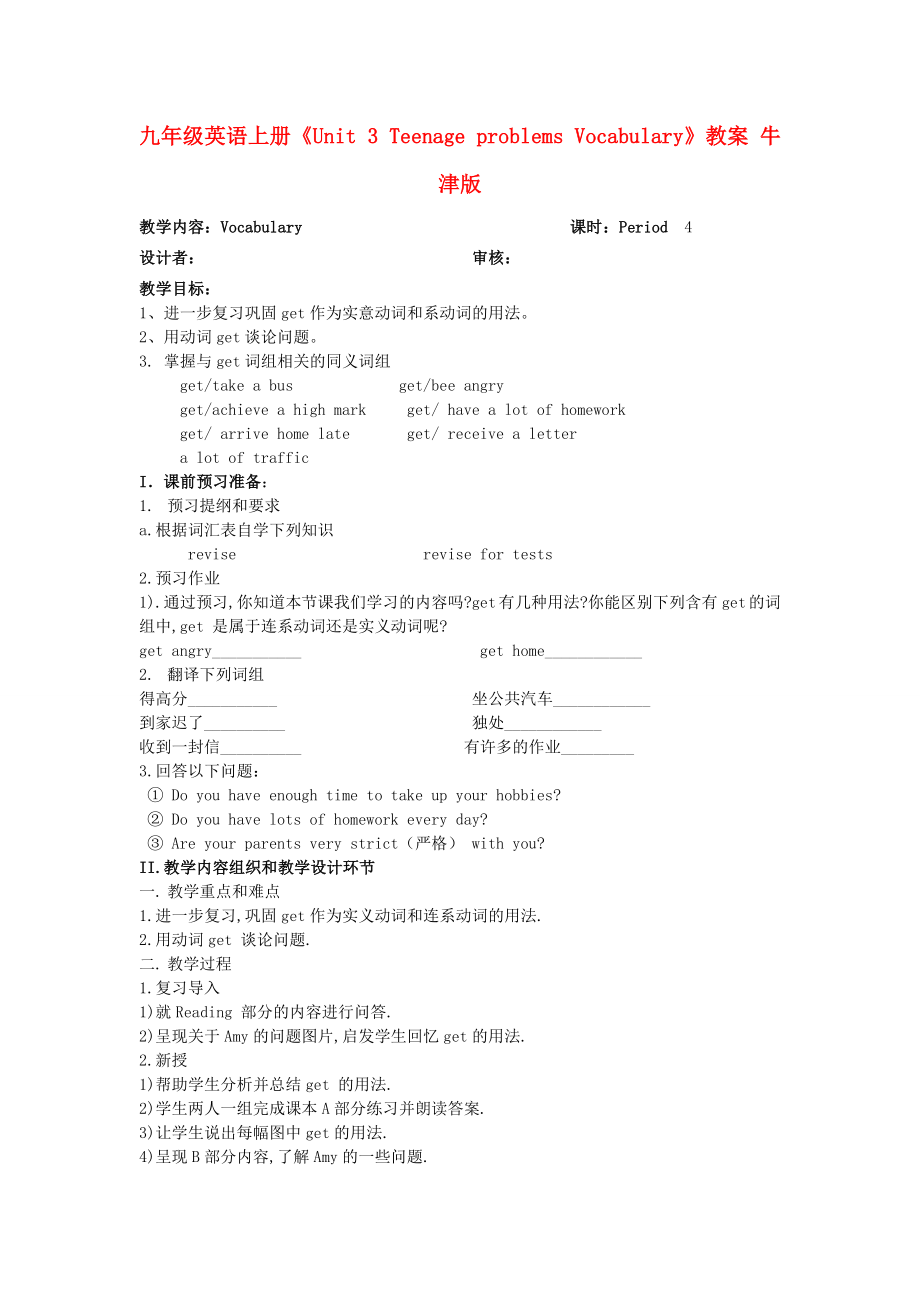《九年級(jí)英語(yǔ)上冊(cè)《Unit 3 Teenage problems Vocabulary》教案 牛津版》由會(huì)員分享,可在線閱讀�,更多相關(guān)《九年級(jí)英語(yǔ)上冊(cè)《Unit 3 Teenage problems Vocabulary》教案 牛津版(2頁(yè)珍藏版)》請(qǐng)?jiān)谘b配圖網(wǎng)上搜索。
1�、九年級(jí)英語(yǔ)上冊(cè)《Unit 3 Teenage problems Vocabulary》教案 牛津版
教學(xué)內(nèi)容:Vocabulary 課時(shí):Period 4
設(shè)計(jì)者: 審核:
教學(xué)目標(biāo):
1、進(jìn)一步復(fù)習(xí)鞏固get作為實(shí)意動(dòng)詞和系動(dòng)詞的用法�。
2、用動(dòng)詞get談?wù)搯?wèn)題�。
3. 掌握與get詞組相關(guān)的同義詞組
get/take a bus get/bee angry
get/achieve a high mark get
2、/ have a lot of homework
get/ arrive home late get/ receive a letter
a lot of traffic
I.課前預(yù)習(xí)準(zhǔn)備:
1. 預(yù)習(xí)提綱和要求
a.根據(jù)詞匯表自學(xué)下列知識(shí)
revise revise for tests
2.預(yù)習(xí)作業(yè)
1).通過(guò)預(yù)習(xí),你知道本節(jié)課我們學(xué)習(xí)的內(nèi)容嗎?get 有幾種用法?你能區(qū)別下列含有g(shù)et 的詞組中,get 是屬于連系動(dòng)詞還是實(shí)義動(dòng)詞呢?
get angry___________
3�、 get home____________
2. 翻譯下列詞組
得高分___________ 坐公共汽車____________
到家遲了__________ 獨(dú)處____________
收到一封信_(tái)_________ 有許多的作業(yè)_________
3.回答以下問(wèn)題:
① Do you have enough time to take up your hobbies?
② Do you have lots of homework every
4、 day?
③ Are your parents very strict(嚴(yán)格) with you?
II.教學(xué)內(nèi)容組織和教學(xué)設(shè)計(jì)環(huán)節(jié)
一. 教學(xué)重點(diǎn)和難點(diǎn)
1.進(jìn)一步復(fù)習(xí),鞏固get作為實(shí)義動(dòng)詞和連系動(dòng)詞的用法.
2.用動(dòng)詞get 談?wù)搯?wèn)題.
二. 教學(xué)過(guò)程
1.復(fù)習(xí)導(dǎo)入
1)就Reading 部分的內(nèi)容進(jìn)行問(wèn)答.
2)呈現(xiàn)關(guān)于Amy的問(wèn)題圖片,啟發(fā)學(xué)生回憶get的用法.
2.新授
1)幫助學(xué)生分析并總結(jié)get 的用法.
2)學(xué)生兩人一組完成課本A部分練習(xí)并朗讀答案.
3)讓學(xué)生說(shuō)出每幅圖中g(shù)et的用法.
4)呈現(xiàn)B部分內(nèi)容,了解Amy的一些問(wèn)題.
5)學(xué)生通讀
5�、書信,然后完成短文.
6)全班核對(duì)答案并朗讀短文.
7)展示與講解.
8)評(píng)價(jià)并擴(kuò)充
9)活動(dòng)
a.游戲
b.找朋友
10)作業(yè)
III.知識(shí)的鏈接與拓展
與get 一樣用法的一些動(dòng)詞,如turn, look 等.
IV.知識(shí)的過(guò)關(guān)與檢測(cè)
一.應(yīng)知應(yīng)會(huì)內(nèi)容.
1. get的兩種用法.
2. 與get詞組相關(guān)的同義詞組.
二.專項(xiàng)練習(xí)
選擇填空
A. hear from B. understand C. buy D. repair
( )1.Can you get my bike work again ?
( )2.I
6、’m terribly sorry. I didn’t get you at all.
( )3.I’m glad to get a letter from Millie .
( )4.What wonderful sunglasses you are wearing !Where did you get them ?
( )5.The traveler got bitten by a snake during his walk.
時(shí)態(tài)填空
1. It _________ (be) five years since I _________ (meet) you last.
2
7�、. Can I do anything _________ (help), mum?
3. Who do you think _________ (get) the ticket?
4. —Where is Jim? He _________ (want) on the phone.
—He _________ (write) a letter in the room.
5. He preferred __________ (swim) to _________ (skate)
6. Why not ____________ (not play) basketball instead of _________ (swim)?
教后反思及補(bǔ)救措施:
 九年級(jí)英語(yǔ)上冊(cè)《Unit 3 Teenage problems Vocabulary》教案 牛津版
九年級(jí)英語(yǔ)上冊(cè)《Unit 3 Teenage problems Vocabulary》教案 牛津版

